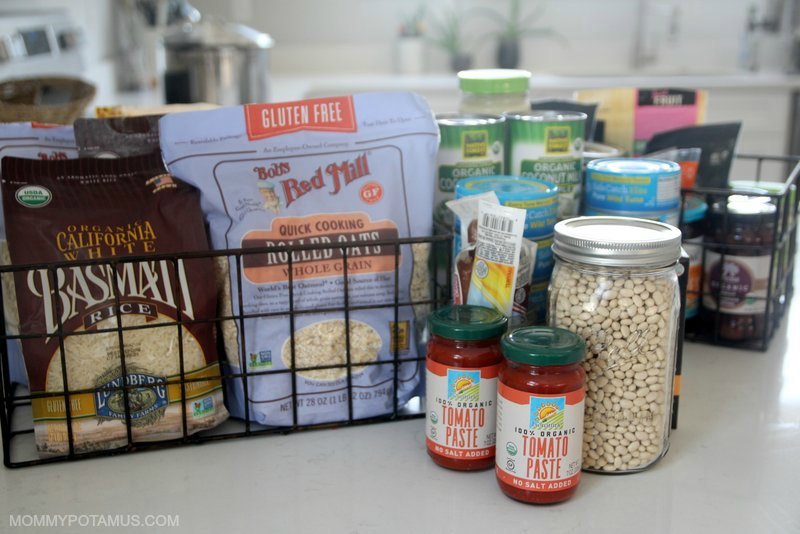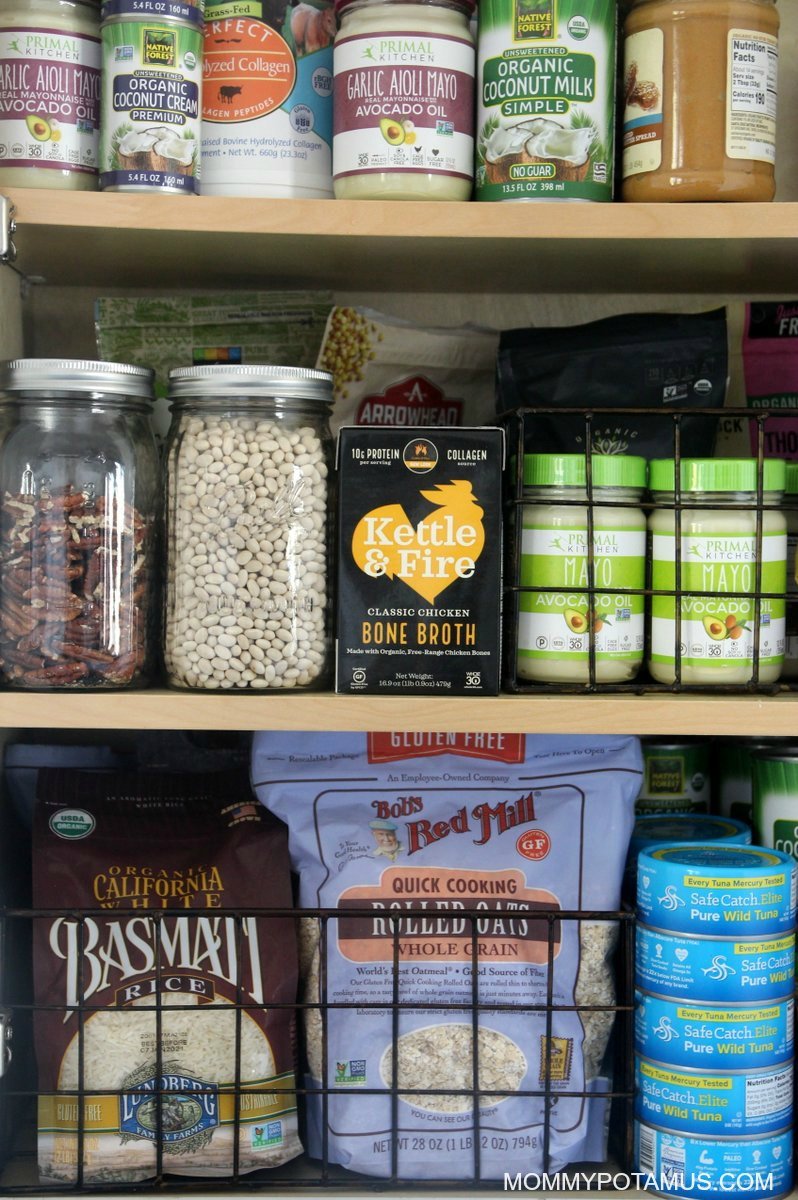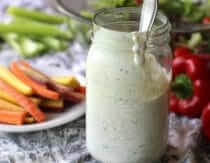
We’re in this together. Washing our hands. Cleaning surfaces more. Caring for the vulnerable in our communities by staying home as much as possible.
According to Dr. Marguerite Neill, an infectious disease expert at Brown University, it’s ideal to have a 30-day supply of food and other necessities on hand if possible. (1)
For those of us that focus on fresh produce as part of a wholesome diet, that’s easier said than done. I’m not throwing in the towel and stocking up on Twinkies, though.
Consuming excessive amounts of sugar curbs immune function, so I’m sticking with wholesome options as much as possible. (2)
With that in mind, I thought I’d share my strategy for preparing, plus a specific list of my go-to non-perishables and must-haves. Although I’m not an emergency preparedness expert, my hope is that as you scan your shelves and make your shopping list this article will be helpful.
Strategy #1 – Stock up on longer-lasting fresh items when possible
My fridge is packed with veggies right now. Some we’ll eat right away, and some I’ll ferment to increase shelf life. However, I’m also stocking up on produce that last longer at room temperature, including:
- Apples
- Citrus (A good source of vitamin C)
- Winter squash (Acorn, Butternut, Spaghetti)
- Potatoes and yams
- Garlic and onions
Tip #2: Focus on foods you’ll use anyway
With a few exceptions like beans and frozen veggies (which we rarely eat), I haven’t bought any supplies out of the ordinary. Instead, I’m stocking up on items I’ll use anyway . . . just in larger quantities.
Although my family’s grocery bill is going to be higher than usual this month, my hope is that we’ll be able to balance those costs in the coming weeks as we use things up. With that in mind, here’s what I’m focusing on:
Pantry
In certain situations like natural disasters, electricity can’t be counted on. And right now, most of us just don’t have enough room in our fridge/freezer to store enough food for 2-4 weeks. With that in mind, here are some shelf-stable options that are nourishing and easy to incorporate into meals.
Meat
Canned Tuna – Safe Catch is my preferred brand because they scan every single fish for mercury levels (available at Amazon, Thrive Market, Publix, and Kroger)
Canned Salmon – Safe Catch also sells wild Alaska pink salmon, which is really good in homemade salmon patties. Their cans are out of stock, but you can find them in pouches here.
Sardines – Rich in omega-3’s, sardines are a great substitute for tuna in “tuna salad. Find them here.
PaleoValley Grass-Fed beef Sticks – These are so delicious! I personally like the jalapeno flavor, but my kids prefer the original and summer sausage flavors.
PaleoValley Pasture-Raised Turkey Sticks – These savory snacks add some much appreciated variety to our emergency stash. My kids love the cranberry orange flavor.
EPIC Bars – We like the Grass-Fed Beef, Habanero & Cherry EPIC Bar, Wild Salmon & Smoked Maple EPIC Bar, and Grass-Fed Lamb, Currant & Mint EPIC Bar
Fruits & Veggies
Dried Fruit – Raisins, mango, banana, apricots, etc.
Sea Snax – As far as healthy snacks go, seaweed is a great alternative to chips. It’s rich in minerals such as iodine, calcium, sodium, magnesium, potassium, iron, zinc, copper and selenium. I like Sea Snax because they use olive oil instead of canola or safflower oil.
Kettle & Fire Bone Broth – I usually make my own using this recipe, but just in case I don’t have access to whole chickens for awhile I’m stocking up.
Jovial Whole Tomatoes – For adding to soups.
Bionaturae Tomato Paste – For Spanish rice and soups. Cooked tomato products are a good source of the antioxidant lycopene.
Broccoli Seeds for Sprouting – Broccoli sprouts are easy to grow and rich in a potent phytochemical called sulforaphane. (Here’s how to grow sprouts in a mason jar)
Onions & Garlic – Both are immune supportive and last a long time without refrigeration.
Winter Squash – Acorn, butternut and spaghetti squash can be stored at room temperature for 1-3 months. Here are some storage tips, and here’s how to cook spaghetti squash.
Potatoes – Red, yellow, russet, and sweet.
Apples – They’ll stay fresh longest if kept in the fridge, but my fridge space is already spoken for so I’m keeping mine on the counter. Based on my non-scientific observation, Granny Smith seem to last the longest.
Citrus – Lemons, limes, oranges, etc.
Grains & Legumes
Sprouted Quinoa – Can be served savory or sweet. I mix it with coconut milk and fruit to make “porridge,” or add homemade taco seasoning to taste for a savory Mexican-style side.
Beans – Dried or canned
Rice – Most beans are low in methionine and high in lysine, while rice is low in lysine and high in methionine. When eaten together, they make a complete protein.
Oatmeal – Some brands are processed on machinery that also processes wheat, so if you’re sensitive to gluten make sure to look for an option that is gluten-free.
Nuts & Seeds
Nuts & Nut Butters – Nuts are great for snacking, and nut butters can be paired with sliced apples or blended into smoothies with banana.
Seeds – This brand sells a lot of different sprouted seed snacks. As mentioned in this article, soaking and/or sprouting nuts and seeds is thought to increase the bioavailability of their nutrients.
Chia Seeds – For mixing with the coconut milk and dried fruit to make chia seed pudding.
Misc
Coconut Milk – For making smoothies, coconut milk yogurt, chicken curry soup, and more. I like this guar gum-free version.
Canned Soup – Safe Harvest makes wonderful soups but they’re not widely available. I usually make soup from scratch using whatever needs to be used up in my fridge so I’m not sure which brands are best, but most grocery stores seem to have decent options with clean ingredients.
Whole Bean Bulletproof Coffee – Can last up to 9 months sealed.
Olives – Because they’re full of healthy fat and antioxidants (and delicious, of course)
Mayo – When I don’t make my own this is my first choice. It’s also available at Thrive Market.
Herbs & Spices – To make taco seasoning and other flavorful additions. Good seasoning can seriously upgrade rice, beans and other pantry staples.
Salt – For seasoning food and making a hydrating electrolyte drink if needed
Freezer
My family usually keeps an extra freezer in our garage but it went kaput recently. Although I’m working with less storage space, here’s what I’m prioritizing:
Homemade Bone Broth – Chicken soup has long been revered for its immune supporting properties during illness, and at least one study has concluded that it “may contain a number of substances with beneficial medicinal activity” that help to reduce symptoms. Here’s how to make homemade bone broth in an Instant Pot, and here’s how to make it in a slow cooker.
Frozen Veggies – I don’t normally buy these, but they’re a great option for having “fresh” veggies on hand without restocking every week. Here’s what I’m buying:
- California Medley
- Spinach
- Cauliflower
- Broccoli
- Green Beans
- Asparagus
Meat
- Grass-Fed Beef
- Whole Chickens
- Chicken Breasts
- Low Mercury Fish (Haddock, Cod, Salmon)
Fridge
I’m stocking as much fresh produce as I can cram in, plus:
- Eggs
- Fermented Pickles (Bubbies is widely available)
- Naturally Fermented Sauerkraut (I have some Bubbies, and i’ll be making some, too)
So that’s my list for now. Because not every family is able to stock up as suggested, I also made a donation to a nearby food bank.
What are you stocking up on?
I’ll continue to update this list with ideas, so if you see something I missed please let me know.
Sources
- New York Times (2020) How To Protect Yourself and Prepare
- WebMD. How can my diet affect my immune system?





